The App Store remains more profitable for iOS developers than the Google Play store is for Android apps, new estimates reveal, with App Store revenues in China also continuing to climb at a fast pace.
A 2016 retrospective report from analyst firm App Annie claims the number of downloads across both the iOS App Store and Google Play for the entire year exceeded 90 billion, an increase of more than 13 billion compared to 2015. A breakdown of downloads for each store is not provided in the report, but while Google Play made up most of the 15 percent year-on-year increase, iOS downloads still increased more in 2016 than they did in 2015.
As with last year's report, the higher number of downloads does not directly translate into higher revenues for developers. While worldwide app revenue across the App Store and Google Play reached over $35 billion, representing an overall yearly growth of 40 percent, the App Store revenue alone grew by almost 50 percent, with close to half of that increase attributed to China.
The Chinese App Store continued its rise from the third quarter's $1.7 billion in revenue, with the fourth quarter exceeding $2 billion making it the biggest quarter for app revenue in App Store history. Aside from the revenue bump, China's App Store also accounted for nearly 80 percent of download growth for the year, suggesting there to be higher revenue levels incoming in future quarters.
As usual, games continue to be the biggest revenue driver in both stores, making up 75 percent of iOS App Store revenue compared to 90 percent in Google Play. Of that gaming revenue, the Role Playing Game subcategory is said to have generated half of all revenue growth for the year.
Gaming also generates the most revenue in the Chinese App Store, again with role playing games notably making the biggest contribution. In other app categories, social networking apps have the largest revenue gains in China for the fourth quarter, credited to Tencent's QQ app, with revenue increasing year-on-year by 7.2 times to over $70 million.
The biggest gaming launch of 2016, Pokémon Go, is highlighted for its high rate of consumer spending so soon after launch, reaching an estimated $950 million by the end of 2016 across both the App Store and Google Play. The game's meteoric rise meant it exceeded $800 million in revenue in 110 days, less than half the time of Candy Crush Saga, a third of the time taken by Puzzle & Dragons, and less than a quarter of how long it took Clash of Clans to reach the same level.
In terms of global monthly active users, Pokémon Go leads the pack for games on iPhone, with Candy Crush Saga and Clash of Clans taking second and third place. For non-gaming apps, Facebook and Facebook Messenger takes the top spots, with YouTube in third.
Apple itself revealed earlier this month that the App Store paid out some $20 billion to developers in 2016 alone. The single biggest day for the App Store yet was New Year's Day 2017, when customers bought nearly $240 million worth of apps and in-app purchases.
New data from Sensor Tower estimates that App Store revenue grew 60 percent in the fourth quarter of 2016 to $5.4 billion. Major contributions came from streaming apps including Spotify, Netflix and Pandora.
 Malcolm Owen
Malcolm Owen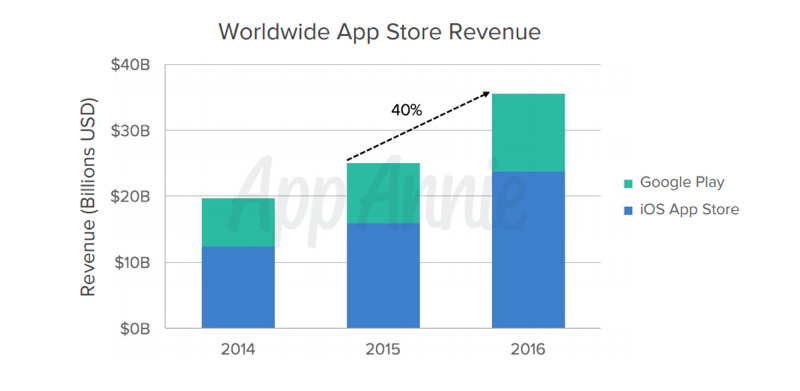
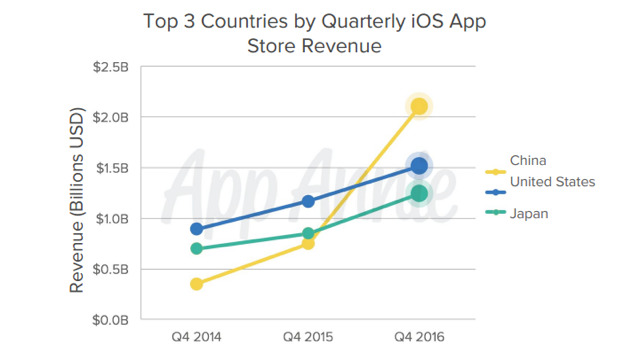

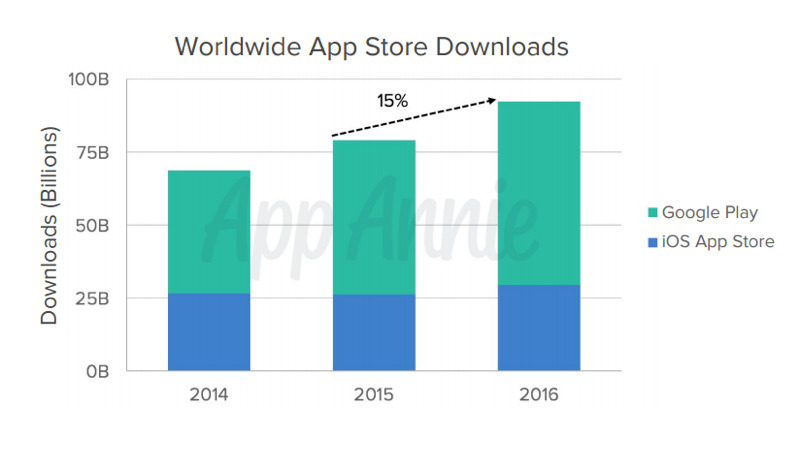







-m.jpg)






 Christine McKee
Christine McKee
 Chip Loder
Chip Loder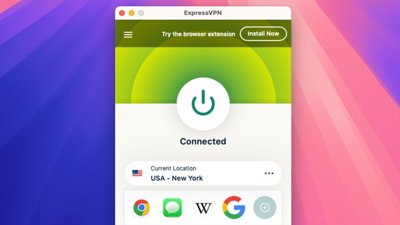

 Marko Zivkovic
Marko Zivkovic
 Wesley Hilliard
Wesley Hilliard


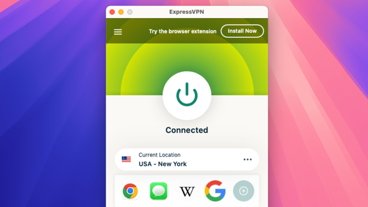




-m.jpg)



18 Comments
So Google has around 3x the number of actual App downloads while Apple has around 2x the revenue.
Meaning the average iOS buyer spends 6x as much as the average Android buyer.
Did I hear someone say market share?
I think the App Store will go the way of the iTMS, in that there will be a clear shift from "owning" to "renting" (aka subscriptions). Who knows, maybe one day there will even be something like an app flat-rate.
Personally, I'm not sure whether this trend is a sign of different market demands, or an attempt to maintain revenue streams in spite of decreasing quality of the offerings.
Min other words, maybe I'm getting old, but over time my App Store purchases decreased, and it has been quite some time since I found a gem in the store.
Same with music. The little I still like to hear, I prefer to buy, one as it is still cheaper over all compared to streaming. Two, because I prefer this slightly absurd feeling of actually "owning" music, which of course by license I don't. Three because the Apple streaming offer doesn't cover my personal taste to a significant extent. So in the end the same like with apps :)
I believe most of the income android devs have to rely on is ads. Would be nice to have some stats on that too.